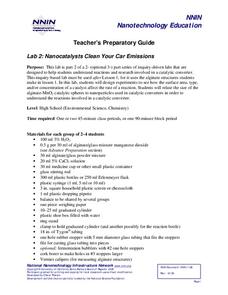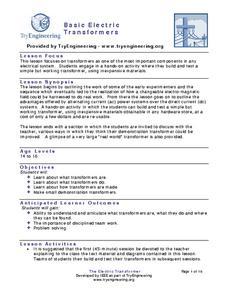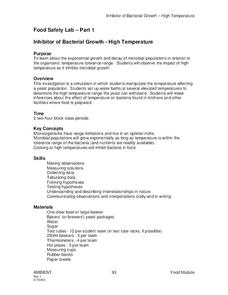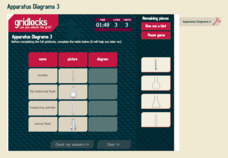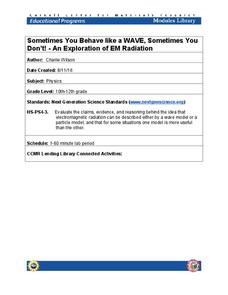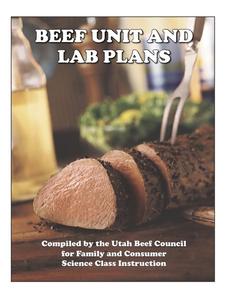Royal Society of Chemistry
A Reversible Reaction of Hydrated Copper (II) Sulfate
How can removing water change the color of a substance? Lab partners remove the water of crystallization from hydrated copper (II) sulfate, record their observations, then rehydrate the solid. The resource is printable and contains ideas...
Physics Classroom
As the Crow Flies Lab
A simple, yet memorable, way of practicing with displacement vectors is described here. Divide your class into groups and assign each a different landmark on campus. They measure smaller legs of the path from the classroom to their...
Curated OER
Cooperative Learning Experience Through the Flipping Lid Demo
Students create a cartoon illustrating a lab demonstration. In this lab safety instructional activity, the teacher demonstrates a small methane explosion to demonstrate the importance of safety in a laboratory setting, then students work...
Curated OER
Introduction to Materials Science
Students locate, identify and describe the purpose and proper use of all safety equipment in the classroom. They describe the processes involved in following the scientific method, and classify matter according to natural or synthetic...
Curated OER
Find Someone Who...
In this lab safety worksheet, students find someone in their class who can answer five different questions about lab safety. They identify the person and write their answer on their paper.
National Nanotechnology Infrastructure Network
Lab 2: Nanocatalysts Clean Your Car Emissions
Surface area certainly surfaces as a variable for chemical reaction rates. Scholars perform an experiment to discover how the size of catalysts affect the rate of a chemical reaction. They record their results in tables and graphs to...
American Chemical Society
The Energy Efficiency of Heating Water
Can a small change in laboratory procedures save energy? Scholars test three different methods for heating water in a science lab. Then, they calculate the energy efficiency for each and compare them to determine which uses the least...
Nuffield Foundation
Following Gene Transfer by Conjugation in Bacteria
After the lab, you'll be able to solve this analogy: Natural selection is to vertical transfer of genes as ___ is to the horizontal transfer of genes. Young biologists conduct an experiment on E. coli bacteria to explore the process of...
Carnegie Mellon University
Introduction to Climate
Begin a full lesson on climate change by demonstrating how carbon dioxide gas contributes to increased temperatures. Be aware that pressure inside the antacid-containing bottle in Activity 2 may cause the lid to fly off; keep viewers at...
Institute of Electrical and Electronics Engineers
Basic Electric Transformers
Life as we know it would not be possible without electric transformers, so there are fewer more pertinent topics for your eager young engineers. An astounding amount of background information is provided to help you develop a lecture on...
Curated OER
Safety Procedures Lab
For this safety procedures worksheet, learners answer questions about eye safety, broken glass safety, lab area safety, chemical safety, fire safety and chemical disposal safety.
Curated OER
Science Safety is Elementary
Third graders are introduced to the importance of science safety. As a class, they role play through different safety procedures and decide which senses need to be protected for different scenerios. They discuss how to avoid hazardous...
Curated OER
Food Safety Lab
Students determine the optimal living conditions for yeast and apply these results to microbes in food. In this microbiology lab lesson plan, students observe the reaction of yeast to elevated temperatures. They relate these results to...
University of Georgia
Heating and Cooling of Land Forms
Compare heating and cooling rates of different land forms. A lab activity has groups collect data on the rate of heating and cooling of soil, grass, saltwater, fresh water, and sand. An analysis of the rates shows how the different land...
Royal Society of Chemistry
Apparatus Diagrams 3
Glassware everywhere! How do you help scholars learn to identify the different types of laboratory glassware? Introduce them to some of the main tools of the trade through interactive puzzles. Users match and manipulate items based on...
Royal Society of Chemistry
Green Plastics—Chemistry Outreach
How do green plastics reduce waste and environmental pollution? Budding scientists create and test a variety of compounds used in green plastics during an insightful experiment. Beginning with startling statistics and ending with...
Royal Society of Chemistry
Organic Molecules Day—Chemistry Outreach
In search of an organic lab that employs real-life techniques and analysis methods? Groups carry out the nitration of methyl benzoate, then attempt to determine the number and location of the nitro groups added to the benzene ring....
Curated OER
Osmosis and Dialysis
How do you engage pupils in a discussion about osmosis without leaving them overwhelmed? By providing them with the tools to perform an exciting experiment, and they will see osmosis in action! Young chemists and biologists use a potato...
Cornell University
Sometimes You Behave Like a WAVE, Sometimes You Don't!
Electromagnetic radiation behaves like both a wave and a particle. Help classes explore this concept through a lab investigation. Young scientists create optical interference patterns on a glass slide using a carbon layer. They analyze...
Royal Society of Chemistry
Investigating Temperature Changes on Evaporating Liquids—Microscale Chemistry
Is there more to evaporation than just less liquid? Show young scientists the energy transformation that occurs during a phase change through a series of simple experiments. Lab partners place drops of water, ethanol, and ethoxyethane on...
Cornell University
Atomic Bonding
Explore the connection of surface area to bonding within atoms. Learners complete lab investigations to model changing surface area with different sizes and concentrations of atoms. A flour fireball demonstration follows the labs to...
Utah Beef Council
Beef Unit and Lab Plan
What are the proper methods for cooking various cuts of beef? What are some basic rules regarding meat food safety? Here you'll find 10 lab plans with a variety of beef cookery activities, perfect for a home economics or cooking course.
National Science Teachers Association
Paper Car Crash Design
High school physical scientists collide with motion. They work in pairs to design a paper car that will protect a raw egg during a head-on collision. Measurements of distance traveled, time of run, vehicle specs, and photo gate flags are...
Royal Society of Chemistry
Electrochromic Polymer—Chemistry Outreach
From windows that tint themselves to OLED technology, electrochromic polymers are redefining our ideas about conducting materials! Introduce your chemistry class to the emerging trend with an exciting lab activity. Budding materials...
Other popular searches
- Science Lab Safety Rules
- Physical Science Lab Safety
- Teaching Science Lab Safety
- Science Lab Safety Symbols
- Science Lab Safety Chart
- Science Lab Safety Contract
- Science Lab Safety Equipment
- Science Lab Safety Videos
- Science Lab Safety Activities
- Science Lab Safety Activites
- Safety in the Science Lab
- Science Lab Safety Song







